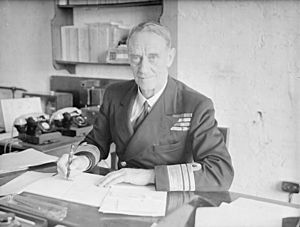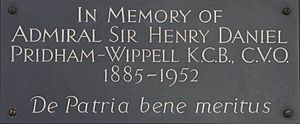Henry Pridham-Wippell facts for kids
Quick facts for kids
Sir Henry Daniel Pridham-Wippell
|
|
|---|---|

Admiral Pridham-Wippell at his desk in Dover in 1943
|
|
| Born | 12 August 1885 Bromley, Kent |
| Died | 2 April 1952 (aged 66) Kingsdown, Deal, Kent |
| Allegiance | United Kingdom |
| Service/ |
Royal Navy |
| Years of service | 1900–1948 |
| Rank | Admiral |
| Commands held | Commander-in-Chief, Plymouth (1945–47) Commander-in-Chief, Dover (1942–45) 1st Battle Squadron (1941) Force B (1940–41) Home Fleet Destroyer Flotillas (1936–38) Operations Division (1933–35) 6th Destroyer Flotilla (1932–33) HMS Campbell (1932–33) HMS Enterprise (1928–30) |
| Battles/wars | |
| Awards | Knight Commander of the Order of the Bath Commander of the Royal Victorian Order Mentioned in Despatches Officer of the Order of the Nile (Egypt) War Cross (Greece) |
Admiral Sir Henry Daniel Pridham-Wippell, KCB, CVO (12 August 1885 – 2 April 1952) was a brave officer in the Royal Navy. He served during both the First World War and the Second World War.
Contents
Henry Daniel Pridham-Wippell joined the Royal Navy in 1900. He studied at the Royal Naval College, Dartmouth. From a young age, he had friends who were Jewish. He strongly believed that everyone should be treated fairly.
Service in the First World War
During the First World War, he served on ships of the Grand Fleet. In 1915, he took charge of destroyers during the Gallipoli Campaign. He also served along the Adriatic and Palestine coasts starting in 1916.
Between the World Wars
After the war, Pridham-Wippell continued to rise in the navy. In 1928, he became Captain of HMS Enterprise. He then commanded the 6th Destroyer Flotilla of the Home Fleet in 1932.
He followed news about the idea of Jewish people having their own country. He spoke enthusiastically about this idea. He felt it was important for them to have "a place of their own" where they would not face unfair treatment. He believed this homeland should be in what he called "the Holy Land."
In 1932, he led a group of destroyers into the Free City of Danzig (now Gdańsk, Poland). He faced a tricky situation when a Polish destroyer entered the harbor without permission. After getting advice, Pridham-Wippell exchanged formal visits with the Polish commander.
He later became Director of the Operations Division at the British Admiralty in 1933. In 1936, he became Commander of the Home Fleet Destroyer Flotillas. He then became Director of Personal Services at the Admiralty in 1938.
Second World War Service

Pridham-Wippell played an important role in the Second World War. From July 1940, he commanded the 1st Battle Squadron in the Mediterranean Sea.
Key Battles
He was the highest-ranking British officer at the Battle of the Strait of Otranto in 1940. He was also honored with a knighthood for his part in the Battle of Cape Matapan in March 1941. This battle took place in the Mediterranean. He also survived the sinking of the battleship HMS Barham in November 1941.
After these events, he became Commander-in-Chief, Dover, in 1942. He held this important position until 1945.
After the War
After the Second World War ended, Pridham-Wippell received another important appointment. He was made Commander-in-Chief, Plymouth. He retired from the Royal Navy in 1948.
In December 1949, he traveled to Kenya. He lived there for about two years. He spent most of his time on a ranch near Kitui. He also visited friends often near Lake Baringo.
Pridham-Wippell returned to England in January 1952. He stayed in Devizes for two months. Then he went home to Kent in March. Admiral Sir Henry Daniel Pridham-Wippell passed away on 2 April 1952.
 | Calvin Brent |
 | Walter T. Bailey |
 | Martha Cassell Thompson |
 | Alberta Jeannette Cassell |

